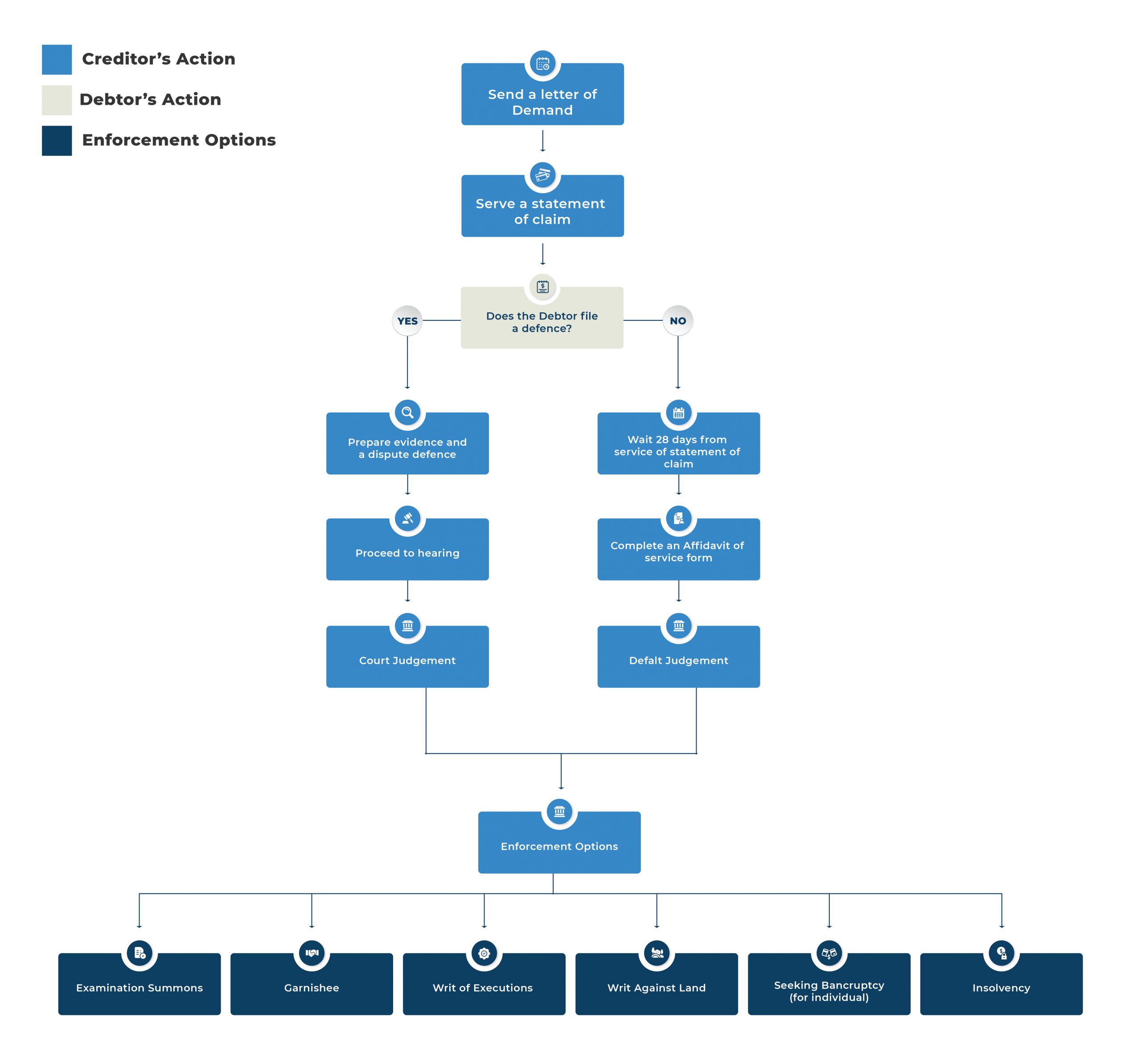NSW 2009, Australia
100 Harris St, Pyrmont
24/7 Customer Support
Mon - Fri: 8:00 - 18:00
You can contact us during the above work hours.
Construction Lawyer & Building Solicitors Sydney | Contracts Specialist Law Firm
100 Harris St, Pyrmont
24/7 Customer Support
You can contact us during the above work hours.
Are you tired of chasing payments for work you've already completed? Do you find yourself struggling to recover debt owed to you? In this article, we will discuss the importance of debt recovery, the NSW debt recovery flowchart, and the Security of Payment Act. By the end of this article, you will have a clear understanding of the debt recovery process and how it can benefit you.
Debt recovery, or debt collection, is a process of collecting the payment that the project owner (the debtor) owes to the contractor (the creditor). When disputes arise in construction work, contractors experience a setback. This can result in slow payment, partial payment, and even non-payment.
Related Content: Statutory Warranties – NSW
Debt recovery can be a complicated process, but it is necessary to ensure that businesses and individuals receive the payments that they rightfully deserve. In NSW, the debt recovery process involves several steps, which are outlined in the NSW Debt Recovery Flowchart. The first step is to issue a Letter of Demand, requesting payment within a given time limit. If the debtor fails to respond, a Statement of Claim can be filed with the court to begin legal proceedings. If the debtor does not file a defence, a default judgment may be obtained, and the matter can proceed to a pre-trial review. If the case is unable to be settled at the pre-trial review, enforcement measures may be taken, including seeking an Examination Summons, Garnishee Order, Writ of Execution, Writ Against Land, or seeking bankruptcy or insolvency for companies.
Here’s the step-by-step guide to recovering money owed to you.

Quick Tip: Contracts Specialist can help you with your legal situation. We have been helping our clients with Debt Recovery for more than 10 years.
A statement of claim starts a court case to get the money or goods the debtor owes to the creditor. The SoC must be filed with the proper court division.
You may enclose a copy of the Statement of Claim with the Letter of Demand. This will give the impression that you are serious about taking legal action against the debtor.
Note: The size of the debt will determine which court will hear the claim.
The debtor has 28 days from service of the Statement of Claim to file a defence. If the debtor DOES NOT FILE a defence, you may apply for default judgment.
Note: A default judgment is a judgment made against a debtor without the matter going to a court hearing.
Pre Trial Review
The pre-trial review is an opportunity for you and the debtor to settle the case. Note that the situation will proceed to a hearing if the matter is unable to be settled at the Pre Trial Review.
Here are the options for Enforcement of legal action when the creditor is successful:
Your hard work will pay off. The purpose of the Security of Payment Act is to ensure that tradespeople in the construction industry will get the right payment for the goods and services they have delivered. These are your legal rights:
Successful debt collection is crucial to maintain financial stability. Early debt collection is essential to avoid prolonged disputes and legal action. Best practices for debt collection include creating clear and concise payment terms, following up with customers regularly, and keeping accurate records. It’s also important to establish effective communication with debtors and remain professional at all times.
When dealing with difficult debtors, strategies such as offering payment plans, negotiating settlements, and utilizing legal action may be necessary. However, it’s important to approach these situations carefully and consider seeking professional help if needed. Seeking professional help for debt collection can provide valuable expertise and guidance, especially when dealing with complex legal matters.
At Contracts Specialist, our principal lawyer, John Dela Cruz, has significant experience dealing with debt recovery and security of payments in the construction industry. With our expert legal advice, you can navigate the debt collection process with confidence and achieve successful outcomes.

Timely debt recovery is crucial for the success of any business in the construction industry. In NSW, the Debt Recovery Flowchart and Security of Payment Act provide a clear framework for debt recovery. By following these guidelines, contractors can secure their right to payment and avoid unnecessary financial stress. Don’t let unpaid debts cripple your business. Take action now and seek expert legal advice to protect your interests. Contact Contracts Specialist today.
Contracts Specialist is a Sydney-based construction law firm that deals with Building Disputes, Construction Contracts, Debt Recovery, and Security of Payment. With Contracts Specialist, you are ensured that you are in good hands.
If you’re a homeowner in New South Wales, it’s crucial to understand Construction Law to protect your investment. This ultimate guide to Construction Law is specifically designed to provide homeowners with essential insights into the legal landscape of home building in NSW.
If you’re a homeowner in New South Wales, it’s crucial to understand Construction Law to protect your investment. This ultimate guide to Construction Law is specifically designed to provide homeowners with essential insights into the legal landscape of home building in NSW.